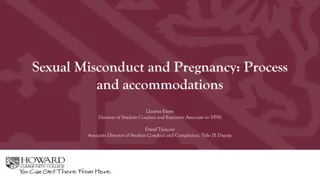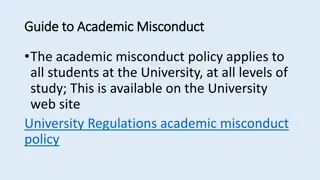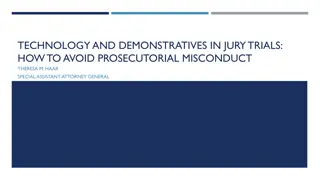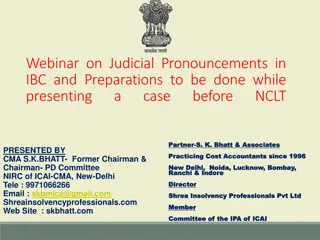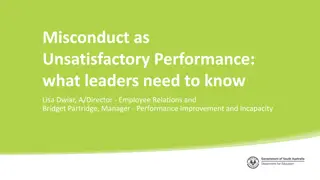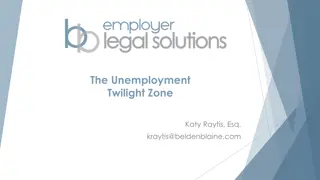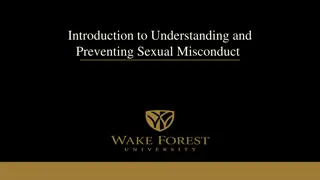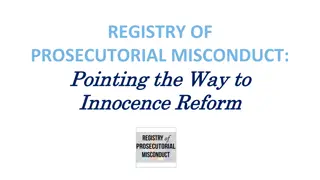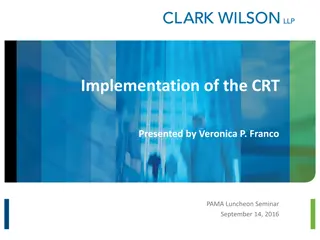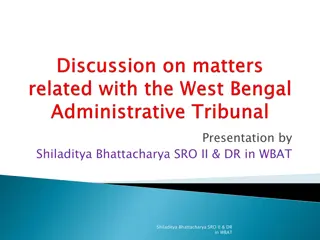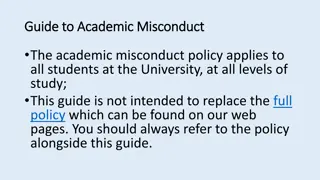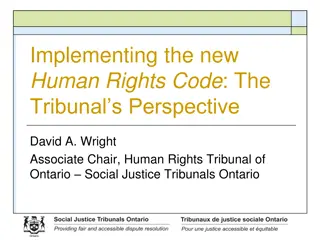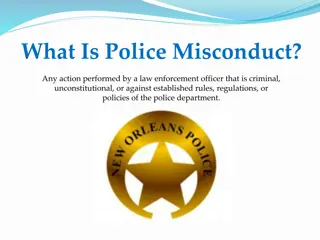Judicial Processes and Misconduct in New Zealand Disputes Tribunal
The New Zealand Disputes Tribunal, led by Principal Referee Anne Darroch, handles civil claims up to $15,000 or $20,000 by consent, with over 60 referees managing 16,000-20,000 claims yearly. Limited appeal rights are in place, with a complaints mechanism under process for all New Zealand Tribunals administered by the Ministry of Justice. The process focuses on maintaining integrity, efficiency, proportionate balance, and a mix of transparency and confidentiality. Misconduct, incapacity, and improper behavior are addressed with potential categories including rudeness, incivility, bullying, bias, and abuse of power. Factors contributing to stress in judicial roles are also considered.
Download Presentation

Please find below an Image/Link to download the presentation.
The content on the website is provided AS IS for your information and personal use only. It may not be sold, licensed, or shared on other websites without obtaining consent from the author. Download presentation by click this link. If you encounter any issues during the download, it is possible that the publisher has removed the file from their server.
E N D
Presentation Transcript
Anne Darroch Principal Disputes Referee New Zealand
Disputes Tribunal New Zealand Civil claims Up to $15,000 or $20,000 by consent Over 60 Referees 16,000-20,000 claims a year Limited rights of appeal No formal complaints mechanism one in process for all New Zealand Tribunals administered by the Ministry of Justice
Power what power? must be removed immediately require you to take action will go straight to the Minister demand an immediate review of the outcome immediate response required .
A process for complaints Maintains integrity of the judicial process Maintains confidence in the judicial process Needs to be Efficient Proportionate Balance transparency and confidentiality
Misconduct Incapacity Improper or unprofessional behaviour An element of intention In the case of Judges can attract high levels of publicity Mental or physical inability to undertake the judicial role Not intentional Can be temporary or permanent Sometimes accompanied by reluctance to leave judicial office
Categories of misconduct rudeness, incivility, bullying partial or biased (reasonable apprehension of bias) delay in delivering decisions professional misconduct administrative misconduct abuse of judicial power for personal advantage Appleby and Le Mire
Factors stress of the role emotional labour the management of feeling to create a publicly observable facial and bodily display (Arlie Hochschild) limited (or shrinking) administrative support difficult parties pressure of time external pressures
Is a complaints process available on your website or in other documentation? What process occurs when a complaint is received?
What powers do you have when a member has engaged in misconduct? Is the complainant advised of the action taken when a complaint is substantiated?
What powers do you have to remove a member for incapacity? Have you had this issue?
What are the three most common complaints? What are the three most common outcomes of complaints?
If you manage a Tribunal which includes Judges, have you observed any discernible difference between complaints against members who are not Judges and complaints against members who are Judges?
Should complaints about members be dealt with by the Head of Bench or an outside authority?
Should a complaints process be published? Should complaints be required to be submitted in a particular format?
Should the outcomes be public? http://judicialconduct.judiciary.gov.uk/disciplinary- statements
Where a complaint is substantiated, should the complainant be informed of any sanction or other action taken?
What is best practice for dealing with vexatious or querulant complainants? ..prone to impute the worst motives to those who are opposed to him or who have to adjudicate upon his case [per Sholl J, R v Collins [1954] VLR 46 at 57-8]
Where a Head of Bench sits, who should deal with a complaint about the Head of Bench?



